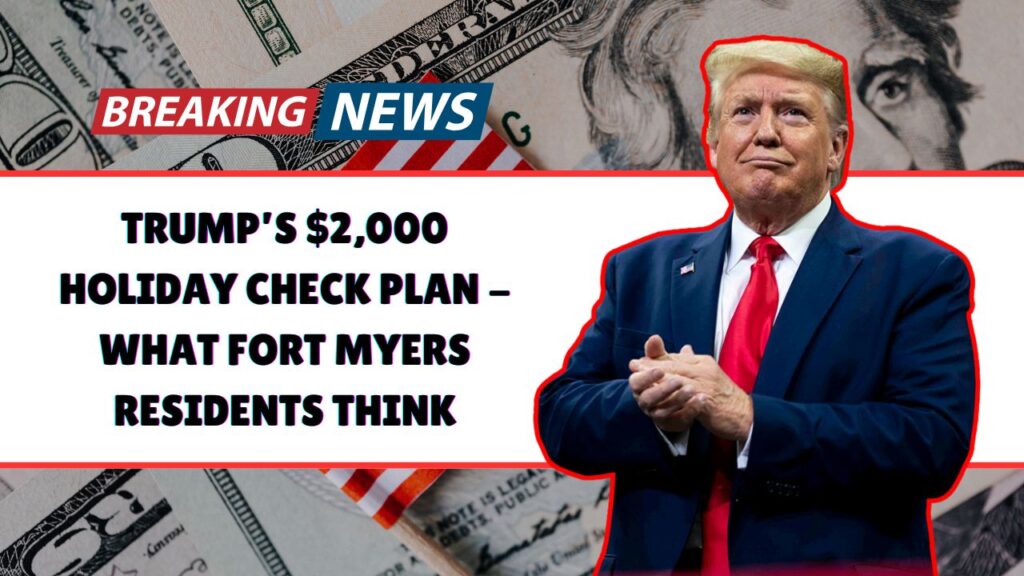President Donald Trump’s new statement about giving $2,000 holiday checks to Americans has sparked mixed reactions across the country.
The proposal, shared recently on his Truth Social account, suggested that every U.S. citizen could receive a $2,000 dividend, except for high-income earners. However, experts believe the plan may be difficult to achieve due to limited federal revenue.
Trump’s $2,000 Promise
In his post, Trump claimed that the United States is now the “richest and most respected country in the world.” He added that the tariffs imposed during his presidency had generated trillions of dollars for the nation.
Based on that, he said Americans should receive a $2,000 per person dividend as a reward for the country’s economic growth.
While the idea of extra cash sounds appealing, economists and financial experts have questioned how such a large payment would be funded.
The U.S. government has been facing high national debt, and current tax revenues may not be enough to cover this type of broad rebate.
Local Reactions in Fort Myers
When WINK News reporters spoke to residents in downtown Fort Myers, people had mixed feelings. Some welcomed the proposal, saying that a little extra money would be a relief for many families still struggling after the pandemic.
Others felt that the government should focus on long-term financial stability rather than short-term payouts.
Here’s what a few residents said:
- “Everybody could use it, especially after COVID. Things are expensive, and people need help.”
- “That money could be better used to reduce the national debt or support Social Security.”
- “You can’t feel bad about getting extra money, but we do have a big debt problem. Still, I’ll take the money!”
These comments show that while many Americans wouldn’t reject a $2,000 payment, there’s growing concern about where the money would come from and what it could mean for the economy.
Expert Opinions
Aubrey Jewett, a political science professor at the University of Central Florida, shared a more cautious view. He believes Trump’s announcement might be more political than practical.
According to Jewett, “The numbers just don’t add up. What President Trump says has been brought in from tariffs isn’t enough to give $2,000 to every household or person. There simply wouldn’t be enough money to make it happen.”
Economists also pointed out that government programs need strong funding sources to remain sustainable. Sending billions in direct checks could raise inflation concerns and add more pressure to the national budget.
Possible Payment Options
The U.S. Treasury Department has not confirmed any official plan yet. Some experts say that if the idea moves forward, it could come in the form of a tax credit instead of a direct cash deposit.
That would mean people receive the benefit when they file their taxes rather than getting an immediate payment.
So far, no timeline or eligibility rules have been shared, leaving many Americans unsure whether the proposal will actually become reality.
Overview of the Proposal
| Detail | Information |
|---|---|
| Proposed By | Former President Donald Trump |
| Payment Amount | $2,000 per person |
| Eligible Recipients | All Americans except high-income earners |
| Funding Source | Claimed to be from tariff revenue |
| Current Status | Not officially confirmed |
| Expert Opinion | Economically unlikely; may be political strategy |
Trump’s $2,000 holiday check proposal has certainly captured national attention. For many Americans, the idea of receiving extra financial help is exciting, especially during the holiday season.
However, experts warn that without a solid financial plan, such payments could increase national debt and create future economic problems.
Whether it becomes a real program or remains a campaign-style promise, people across Fort Myers and the nation are watching closely to see what happens next.
FAQs
No official decision has been made yet. The plan is only a proposal, and experts say funding it would be difficult.
There is no confirmed timeline. The Treasury Department has not announced any payment schedule or eligibility details.
Yes, experts suggest that if approved, the payment might appear as a tax credit during the next tax season rather than a direct payment.
